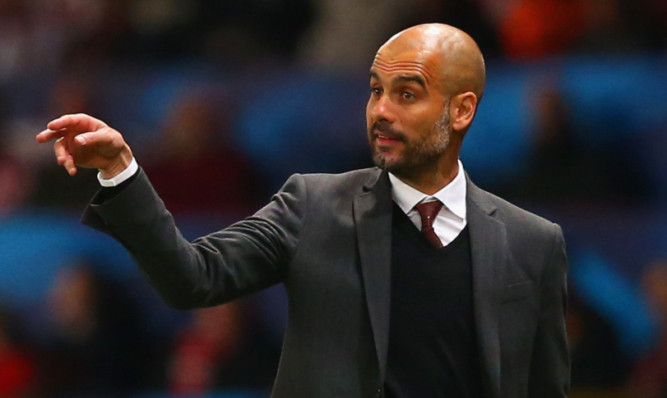
Four European heavyweights are gearing up for the Champions League semi-finals this week, and there is not an English club in sight.
It’s Juventus versus Real Madrid on Tuesday followed by the first leg of Barcelona against Bayern Munich 24 hours later.
While Chelsea may be on the verge of wrapping up the Premier League title this lunchtime if they beat Crystal Palace, the four best sides in Europe remain in UEFA’s premier club competition.
It is hard to argue otherwise when no English side made it to the last eight, and semi-final appearances are becoming rarer, too.
Since Chelsea, Manchester United and Arsenal all made it to the last four in 2009, only three clubs have reached this stage in the last six seasons.
Andres Iniesta’s injury-time volley at Stamford Bridge that took Barcelona to the Final at Chelsea’s expense that year was the tipping point in the balance of power.
Coupled with the transfer of Cristiano Ronaldo from United to Real Madrid for a then world-record fee of £80 million later that summer, the Premier League has ceded ground to the continental giants.
The two Spanish powerhouses, and Bayern Munich, have all reached the last four of the Champions League in five of the last six seasons, creating a virtual monopoly on those places.
And although this is a first semi-final at this level for Juventus for 12 years, they are dominating Serie A with four successive titles.
So the best of the Premier League has to look at these four clubs and see how they can rectify the situation.
One area in which English teams can certainly up their game is in the transfer market.
Real Madrid and Barcelona may have made vast marquee signings in the last two years, with Gareth Bale and James Rodriguez at Real and Luis Suarez and Neymar going to Barca, but the European heavyweights have also shown a bit of savvy too.
Take Ivan Rakitic, who was a stand-out player for Sevilla in the Europa League 12 months ago.
He was not a glamorous name but Barcelona picked him up for £16 million and he has slotted seamlessly into their midfield.
Manchester United and Manchester City could both have done with a mobile, box-to-box midfielder, yet looked elsewhere.
As well as controlling the German market with the free transfer of Robert Lewandowski from Borussia Dortmund, Bayern picked up good deals elsewhere.
Former Liverpool star Xabi Alonso and defenders Mehdi Benatia and Juan Bernat arrived for a combined fee of about £37 million.
That compares to some of the astronomical fees spent by English clubs £30 million for Luke Shaw for Manchester United, Manchester City splashing out £32 million on Eliaquim Mangala and Liverpool spending £117 million on nine new players.
Juventus have been shrewd operators in assembling their squad in recent seasons. Midfielders Andrea Pirlo and Paul Pogba were both snapped up on frees, and they got Carlos Tevez from City for £7.5 million in 2013.
As for now, the wise money is on Real and Barca to come through their semis and meet in the Final in Berlin on June 6 in what would be the biggest-ever ‘El Clasico’.
The Catalans’ two legs against Munich promise to be fascinating as Pep Guardiola returns to the Nou Camp as an opposing manager for the first time.
Since losing to David Moyes’ Real Sociedad on January 4, Barcelona have been excellent and they are finally moving out of the shadow cast by Guardiola.
There has been a subtle change of emphasis from midfield to attack under Luis Enrique, focusing on the front line of Suarez, Lionel Messi and Neymar.
The trio clocked up a century of goals for the season during the 6-0 League win over Getafe in midweek and will carry the threat to Bayern.
The Bavarians have already won the Bundesliga, but that was a given. Hopes of a domestic double were ended, though, with a penalty shoot-out defeat to Dortmund on Tuesday.
It came at a cost as they lost Arjen Robben to injury for the remainder of the campaign, and they are still missing Franck Ribery and David Alaba from their best XI.
The challenge for Guardiola is to show that his brand of football can be successful with a different club.
That means winning a sixth European Cup for Bayern, and they are still smarting from their 5-0 aggregate loss to Madrid at the same stage 12 months ago.
Revenge is also in the air for their opponents, having been humiliated by a 7-0 two-legged scoreline against the Germans in 2013.
That is the more glamorous semi-final, but Real Madrid should be wary of giving Juventus anything less than total respect in the other one.
Juve may not have been this far for 12 years, but they are Italians and they have plenty of nous under coach Massimiliano Allegri.
A record of just one goal conceded in four knock-out games suggest Ronaldo and Co may find them to be a tough nut to crack.
English clubs would be foolish not to be watching carefully. Another poor season in Europe could even result in them falling below Italy in the UEFA co-efficient and losing a Champions League place in 2017.
Now that really would cause panic because four into three does not go and none of our big guns can afford to miss out on the Champions League millions.

Enjoy the convenience of having The Sunday Post delivered as a digital ePaper straight to your smartphone, tablet or computer.
Subscribe for only £5.49 a month and enjoy all the benefits of the printed paper as a digital replica.
Subscribe